Semenya Still Looms Large As Wilson Upset For 800m Gold
Semenya Still Looms Large As Wilson Upset For 800m Gold
The beginning of the Ajee' Wilson era at global championships was put on hold on a day when her event's past loomed large.

Just as Ajee’ Wilson appeared on the verge of becoming the face of this new era in women’s 800m running, a newcomer stunned her on Monday to add another chaotic twist to the event.
Uganda’s Halimah Nakaayi, a first-time World Championship finalist, sprinted past Wilson with 50 meters to run in Doha to become the first non-DSD (differences of sexual development) woman to beat the American this season. Then Wilson’s teammate and training partner Raevyn Rogers did the same, passing Wilson with a heroic final 100m that saw her go seventh to silver out of lane four.
Nakaayi ran 1:58.04 to set a national record, with Rogers next in 1:58.18. Wilson, who lost to both women for the first time in her career, took bronze in 1:58.84.
TWO ?? medals in the 800m final!
— FloTrack (@FloTrack) September 30, 2019
? Raevyn Rogers @TheROYALlife21
? Ajee Wilson @AjeeW #WorldAthleticsChamps pic.twitter.com/Jo60hhffHS
While the Ugandan zoomed to history, becoming the first woman from her country to win worlds gold, Wilson missed out on her best shot so far to make her own. She had not lost since the Caster Semenya reign officially ended in late June, a run that seemed to foreshadow her becoming the first American to win 800m gold at the world championships.
“That last stretch, I expected to be able to respond, but that wasn’t the case today, unfortunately,” said Wilson.
This was the first global championship within Wilson’s reach, as Caster Semenya and Francine Niyonsaba -- first and second in 2016 and 2017 -- were barred from competing beginning this season due to testosterone regulations on DSD women. Their departures were as controversial as they were convenient for Wilson, who suddenly became the top half-miler in the world by default in 2019.
But her loss at Khalifa International Stadium capped off a surreal day for the women’s 800m in Doha. Exactly six hours prior to race time on Monday, the IAAF held a reallocation ceremony for three women -- Americans Alysia Johnson Montańo and Brenda Martinez, as well as Kenyan Janeth Jepkosgei -- who had been cheated out of medals by Russian doper Mariya Savinova.
Their presence in Doha was symbolic of an era particularly rife with doping in women’s middle distance running. But it was who was not there who overshadowed both 800m podiums of past and present: Caster Semenya was the fourth woman due a medal upgrade in Doha, with her absence from the ceremony and tonight’s race symbolizing her pariah status within the sport.
The medal redo showed the IAAF trying to rectify its past. Semenya not being there was a reminder of what the governing body continues to get wrong by preventing her from competing. Wilson, uniquely impacted by both controversies, has been a victim of her own success this year, with only her untimely loss on Monday averting the association of her performances relative to Semenya.
But Semenya, and by extension Wilson, have been inadvertently caught up in what can only be described as a smoke and mirrors act by the IAAF. The venue for these championships coupled with Semenya’s plight shows what the governing body has screwed up, with no event more impacted than the women’s 800m.
A conspicuously empty crowd has been a black eye for the IAAF throughout the first four days of competition in Doha, Qatar, as a cascade of vacant maroon and white seats have greeted track and field’s main event
The indifference the region has shown to the first half of the IAAF World Championships has hardly been a surprise. In a country mired in human rights concerns under an authoritarian regime, the Qatari people have no obligation to turn up for an event that has more to do with creating a facade than growing athletics.
One aspect of the championships that the IAAF is fine going unnoticed are the medal reallocation ceremonies. Billed as the righting of a wrong for athletes whose money and medals were stolen by drug cheats, the charade reflects worse on the IAAF than anyone else.
Congratulations @AlysiaMontano and @bmartrun on your upgraded medals from the 2011 and 2013 IAAF World Championships ??https://t.co/hq51GfVMhT pic.twitter.com/geb62gUz5r
— USATF (@usatf) September 30, 2019
“It took for Yuliya Stepanova [Russian whistleblower] to report her teammates, talking about them doping for them to be exploited on what they were doing,” said Johnson Montańo. “There’s many other athletes that unfortunately aren’t going to get this victory because the IAAF is making it look pretty. That’s what I know.”
But the IAAF would like you to believe that it is Semenya, not Savinova, who has caused the most harm to women’s 800m over the last decade. She was forbidden from defending her 2017 world title and therefore robbed of two moments of glory in 2019.
“It’s been really hard for me to form an opinion on it. Me and Alysia were talking about it when we went up to get our medals,” said Martinez. “You’ve got to remember that she’s human. We were really turned off by how people were treating her.”
“I do get that there’s an unfair advantage, but at the same time she is a person and I don’t want this to come off bad, but I’d rather compete against an intersex athlete than a drug cheat.”
By eliminating Semenya, the IAAF has scarred the legacy of a champion and left the residual pieces to be carried by the current 800m runners.
Wilson has carried that burden longer than anyone else. But now an era with her firmly at the top has been put on hold, with the shadow of the event’s past continuing to obscure anything happening on the track.
Related Content
 Replay: Great Manchester Run | May 26 @ 11 AM
Replay: Great Manchester Run | May 26 @ 11 AMMay 26, 2024
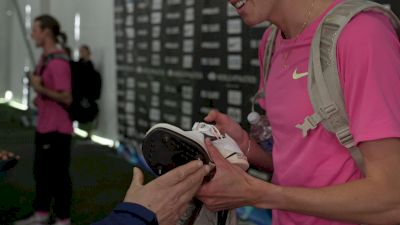 Cooper Teare Is Happy With 3:53.9 Mile After Getting Spiked
Cooper Teare Is Happy With 3:53.9 Mile After Getting SpikedMay 25, 2024
 Cole Hocker Gets Tripped Up, Runs 3:48 In Bowerman Mile
Cole Hocker Gets Tripped Up, Runs 3:48 In Bowerman MileMay 25, 2024
 Jake Wightman Clocks 3:47.83 Mile PB in Bowerman Mile
Jake Wightman Clocks 3:47.83 Mile PB in Bowerman MileMay 25, 2024
 17-Year-Old Cameron Myers Goes 3:50 At 2024 Prefontaine Classic
17-Year-Old Cameron Myers Goes 3:50 At 2024 Prefontaine ClassicMay 25, 2024
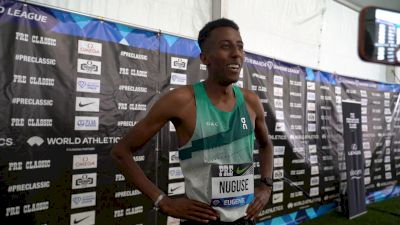 Yared Nuguse Is Satisfied With Bowerman Mile Performance
Yared Nuguse Is Satisfied With Bowerman Mile PerformanceMay 25, 2024
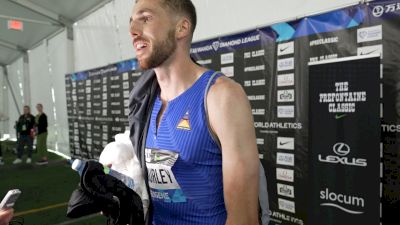 Neil Gourley Runs 3:47.74 Mile PB To Finish 4th at 2024 Prefontaine Classic
Neil Gourley Runs 3:47.74 Mile PB To Finish 4th at 2024 Prefontaine ClassicMay 25, 2024
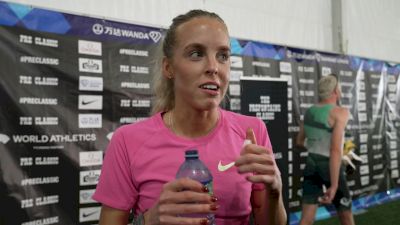 Keely Hodgkinson Has CRAZY Last 200m To Win 2024 Prefontaine Classic 800m
Keely Hodgkinson Has CRAZY Last 200m To Win 2024 Prefontaine Classic 800mMay 25, 2024
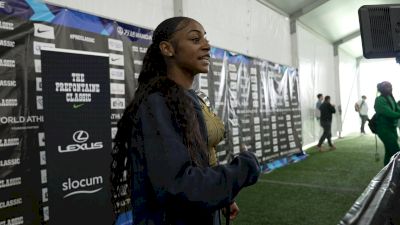 Sha'carri Richardson Is Happy With Her 10.83 100m Win at The 2024 Prefontaine Classic
Sha'carri Richardson Is Happy With Her 10.83 100m Win at The 2024 Prefontaine ClassicMay 25, 2024